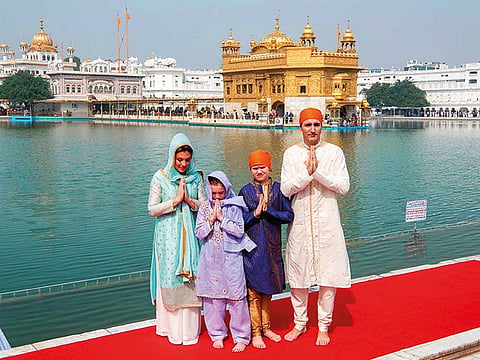Trudeau trip sours India-Canada ties
Countries trade charges over Atwal invitation controversy

MADRID: Normally, a visit to India by a Canadian Prime Minister is a friendly and sedate affair. But the recent trip by Prime Minister Justin Trudeau to the sub-continent has sparked an unseemly political dispute and has set back relations between the two nations.
And the row has intensified following a claim by a senior Ottawa official that the presence of a convicted wouldbe assassin, Jaspal Atwal, on the trip was the result of a plot by elements within the India government.
Atwal, A Sikh extremist, was convicted of attempting to murder India cabinet minister Malkiat Singh Sidhu in British Columbia (BC) during a visit there in 1986. He was also charged but not convicted of attacking Ujjal Dosanjh, who later went on to become the Premier – or chief minister – of BC and later, a federal cabinet minister.
Trudeau visited India in mid-February and was accompanied on the trip by 14 Members of Parliament. It was one of those, Randeep Sarai, who invited Atwal to a reception with Trudeau at the Canadian High Commissioner’s residence in New Delhi. Earlier during the trip, he was photographed with Trudeau’s wife, Sophie Gregoire Trudeau, and Liberal Infrastructure Minister Amarjeet Sohi at another event.
Atwal was allegedly a member of the International Sikh Youth Federation, which is deemed a terrorist group in Canada and India. He denies it. Sarai has stepped aside as chair of the BC caucus of Liberal Party MPs, but only after Atwal’s presence became a major political embarrassment to Trudeau.
Atwal was only recently removed from a black list of people banned from India.
The controversy was given new life following a suggestion by a senior Canadian security source that rogue factions within the Indian government had helped engineer Atwal’s presence. The source went further, suggesting that those factions were concerned Ottawa did not fully support a united India and were looking to undermine the strong relationship between India and Canada.
Speaking to The Globe and Mail newspaper on condition of anonymity last week, a senior government source said the Indian factions in question are concerned about the threat of Sikh extremism, especially among the Sikh diaspora in Canada, and believe that the Canadian government is too complacent on the matter.
In Ottawa, facing parliament for the first time since the India trip and the Atwal controversy erupted – opposition MPs are calling the security source claims a “conspiracy theory” – Trudeau stood by the claims.
“When one of our top diplomats and security officials says something to Canadians, it is because they know it to be true,” he told Parliament.
But the Prime Minister’s response has only emboldened both Conservative Leader Andrew Scheer and the New Democratic Party.
“Justin Trudeau just made an incredibly serious charge against the Indian government – which has real implications for Canada’s foreign relations and national security,” Scheer said in a tweet. “He needs to provide proof of this immediately.”
Atwal said any suggestion that the Indian government helped him get off the blacklist or into the reception is a “total lie.”
—With inputs from agencies



